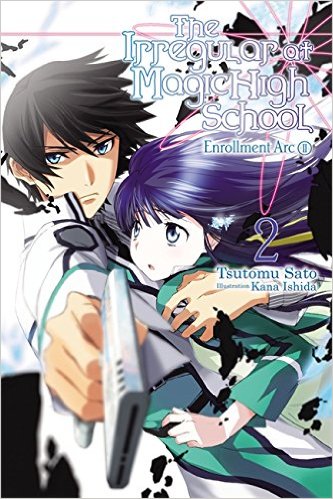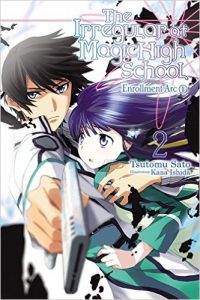By Tsutomu Sato and Kana Ishida. Released in Japan as “Mahouka Koukou no Rettousei” by ASCII Mediaworks. Released in North America by Yen On. Translated by Andrew Prowse.
Multi-volume arcs in light novel series are nothing new, and quite popular. The usual thing to do is a two-volume arc, though they can balloon up to 5 (Baccano’s 1935 arc) or even 10 (SAO’s Alicization arc). It’s rare to see a series begin with a two-volume arc, and as you read the second volume of Mahouka (as the series is commonly abbreviated to), you guess why – this was originally one huge book that the publisher demanded be cut in half. The author admits this in the notes at the end. As such, it’s not something meant to be taken in on its own, and doesn’t try to be. It’s the second half of the first book, with a few more terrorist attacks and less school prejudice.
There’s a lot of talk in these volumes, both in regards to how magic works in the world and in how the political landscape is affected by it. The narration is very much down on the side of those with magic, but at least tries to understand the viewpoint of one who does not have such magic skill, and has to look on in envy and frustration at those who do. In fact, I felt one of the biggest flaws of this book was towards the end, where it was revealed that the cute kendo girl who was working for the bad guys was doing so mostly due to simple mind control, rather than her own misguided beliefs. I suppose the author wants to keep her around rather than expel her, but still, you’d be surprised how often misguided beliefs are a good enough reason on their own and don’t need extra help.
I said this last time, and I will again: I have no idea how the anime handles Tatsuya’s thought process, which is constant throughout the book, but if it simply cuts it and goes with what he’s saying out loud, that’s a horrible mistake. There’s several times throughout this book where he’ll say something and then think to himself that he’s saying that just to go along with the flow, or put people off their guard, and that his feelings are almost the opposite. This even applies to the unfortunate incest subtext that’s still hanging around. It’s not all on Miyuki’s end, and we can see that she and Tatsuya both play it up to the hilt because they know if they exaggerate it that others will dismiss it – as Erika seems to here. Of course, this does not mean it isn’t there.
There’s also a lot of fighting towards the end, and it’s reasonably well done, though of course it does point out that Tatsuya is, shall we say, good at nearly everything. This is not going to change anytime soon, and he’s hardly the worst offender in light novels, but it can be frustrating to an audience that is seeking out a more flawed hero. It’s especially frustrating when combined with his stoic personality, though that can also be a blessing, as imagining Tatsuya as some shonen hothead but with the same abilities gives me a headache. In the end, this was a decent if flawed start to the series, and the next two volumes (this time seemingly intentionally written as an actual two-book series) look to show off an athletics festival between the various schools. Note this comes out in North America at the exact same time as A Certain Magical’s Index’s 2-book athletic festival series, which is an amusing coincidence. Fans of Index, SAO, or magic schools might find Mahouka worth getting.


“I said this last time, and I will again: I have no idea how the anime handles Tatsuya’s thought process, which is constant throughout the book, but if it simply cuts it and goes with what he’s saying out loud, that’s a horrible mistake”
Unfortunately, that’s what the anime more or less did. Which made Mahouka a byword for wish-fulfillment bad anime. Even if the wish-fulfillment part is completely unjustified in the source material, given the internal narratives of Tatsuya and Miyuki reveal how Mahouka is most certainly the furthest from wish fulfillment.